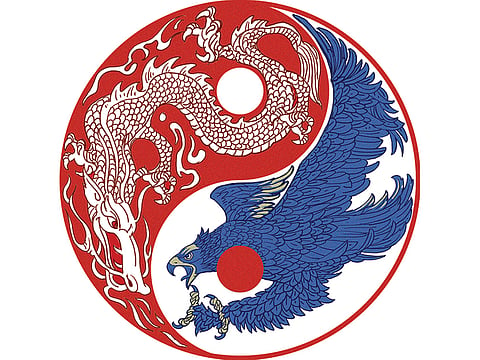China-US rivalry must be handled
Economic links of the Asian powerhouse may be welcome to many, but it needs to work within established global order

There is a depressing view that China and the United States must be seen as rivals. There is very little momentum behind the idea that these two superpowers could (or even should) cooperate and help build a stable world order for the next century. Instead, China’s rising power is seen as a clear challenge to US hegemony and under this black and white worldview, any cooperation with China is seen as a counter move to the US. Under this narrow perspective, Chinese President Xi Jinping’s current visit to Britain is seen as a snub to the US and Britain’s partners in the European Union.
But there is a wider perspective under which the world needs to prepare to work more closely with China as it emerges from its isolationist past. The Gulf states have recognised this for some years, as China, along with South Korea and Japan, have become their major long-term customers for oil, and both sides recognise a vital need to build stronger relationships.
The rivalry with the US was epitomised recently by the launch of the Asian Infrastructure Investment Bank (AIIB), which was seen by the US as a serious rival to the Asian Development Bank (ADB). The Americans warned its friends from joining AIIB, but were ignored by many, including Britain, which led the charge to join. Even Christine Lagarde, the managing director of International Monetary Fund, welcomed the new bank, pointing out that there are more than enough projects for all such banks to get on with.
To date, the AIIB has 57 members, and the most significant refusals to join only come from the US and Canada, as well as Japan, which enjoys and would like to keep its dominating position in the ADB.
But it is a mistake to look at China’s emergence only from Washington’s position. China has been very clear about how it wishes to engage with the outside world. The latest incarnation of China’s strategy has been defined under the “One Belt, One Road” plan that Xi outlined in May 2014 at a conference in Shanghai. The phrase sums up a combination of the Silk Road Economic Belt that will connect China with Central Asia, Southeast Asia, South Asia, Russia and Europe, while the Maritime Silk Road will link China’s coast to South Asia, South Pacific, the Middle East and East Africa.
Difficult relations
Conspicuously absent from this plan are North America, where how to handle China’s rivalry with the US remains one of the huge global questions yet to be resolved; and North East Asia, where China’s difficult relations with Japan and Korea to a lesser degree need to be sorted out before including them in the grand plan. Nonetheless, these two huge strategic moves (the terrestrial Belt and the maritime Road) aim to link China to 55 per cent of the world’s gross domestic product and more importantly to 70 per cent of the world’s energy reserves.
And much of this Chinese activity is not seen as a threat by many of China’s Asian neighbours. The most recent Asian Barometer Survey published in the Global Asia magazine in Seoul found that most East Asian countries accept that China is a constructive power when it comes to the region’s peace and prosperity. The exceptions are Japan, which has historic grievances and current strategic competition with China; Myanmar where resentment over economic exploitation has been increasing; and the Philippines where China’s actions in the South China Sea caused a major fall from approval.
Other than these states, the majority of East Asian populations are seeing the economic benefits that China is bringing to the region, like the Pan Asian highway and high-speed rail link to Thailand, which in due course is set to make Bangkok a pivotal transportation hub in South Asia. The Koreans gave China a mid 50 per cent approval rating, focusing their antipathy more on Japan.
But outside the economic sphere there are political dangers created by China’s new international presence. While many nations may seek benefits from One Belt One Road, there are obvious examples of aggression such as China’s handling of its South China Sea claims, which have put it into direct conflict with the Philippines and its allies — including the US — and challenged many of the basic precepts of the Law of the Sea.
There is a real danger that China will embrace the disdain that the US has developed under former president George W. Bush for the United Nations and the delicate web of international treaties that have established the global order under which we live and trade today. American unilateralism and exceptionalism are a serious mistake but they come from a nation that helped set up this order, and while they weaken it, they have not yet destroyed it. But if China was to adopt the same arrogance it might well find it easier to completely ignore many of the treaties and not even observe much of their spirit.
This is why engagement with China on managing the global order is important, and why a continuing conversation with Xi is crucial. One can only hope that this week, the dignified Queen Elizabeth has added to this vital global discussion with her enigmatic houseguest, no doubt well-supported by her co-host Prince Philip.
Sign up for the Daily Briefing
Get the latest news and updates straight to your inbox



